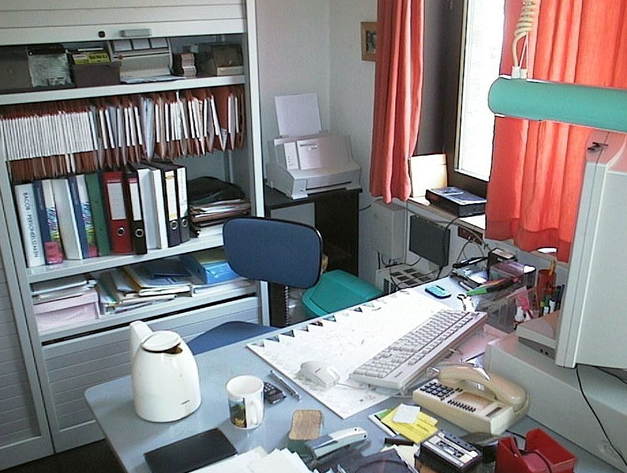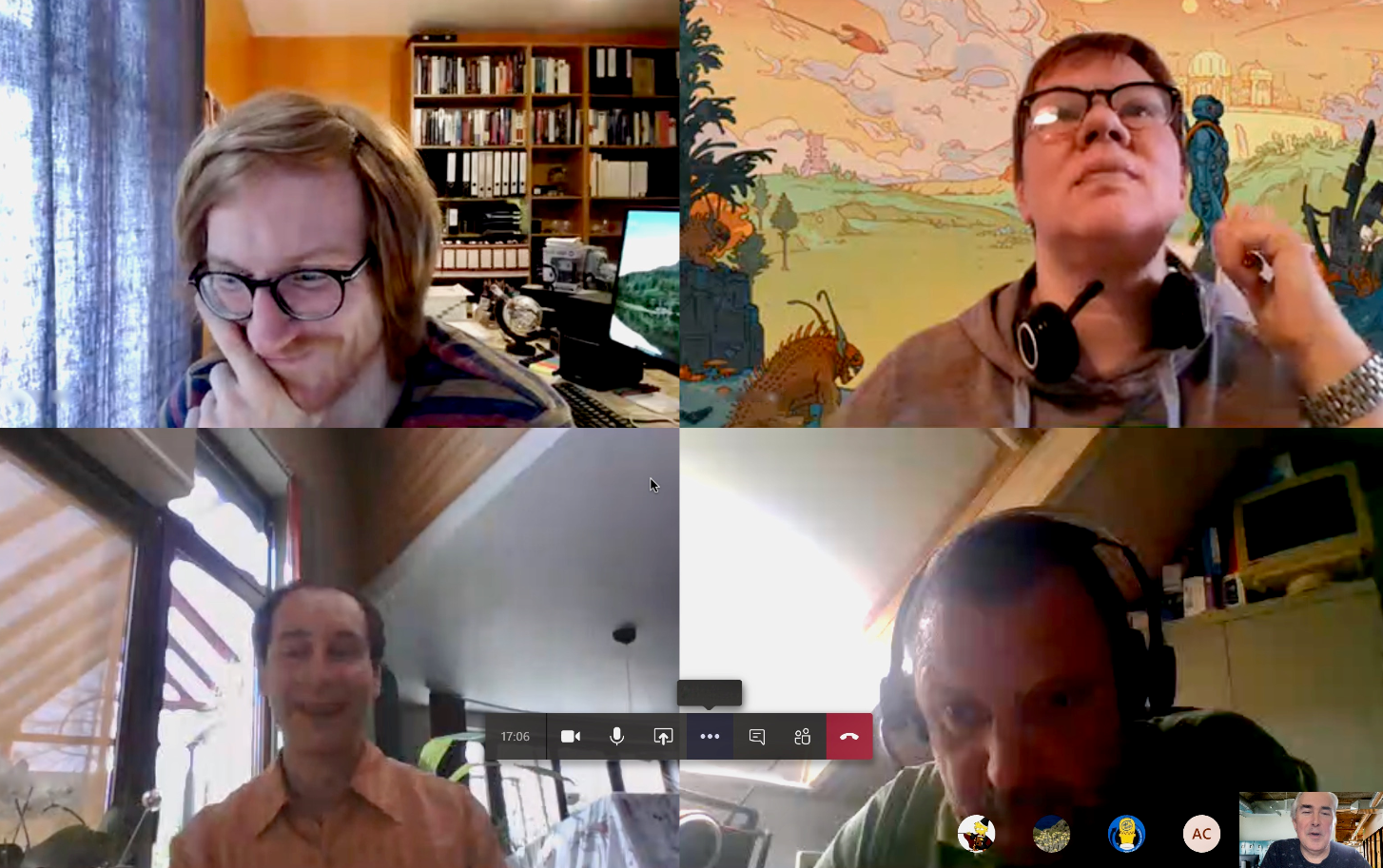Flashback to 1998: Stefaan Huysentruyt was one of the first teleworkers last century
During the coronavirus crisis, there are plenty of smart professionals at VUB. But working at VUB is now mainly working for VUB but from home. What’s the reality of the switch from workplace to homeworking? How do we deal with the blurring of boundaries between work and life?
Recognise these situations? We asked our VUB colleagues how they are getting on with the new reality of homeworking. With an eye on best practice, they shared their surprising tips and tricks.
Stefaan Huysentruyt
Stefaan has been working as a software developer at VUB for many years. He now teleworks from Zedelgem, West Flanders, mainly for the internal client Research Information and Data Management. He supports the alignment of rapidly evolving needs. In concrete terms, he integrates a purchased software package with the VUB platform and implements access to information for the government and other agencies.
Flashback to 1998: a pioneer in teleworking
Because of the coronavirus crisis and its consequences for digital working, Stefaan is getting flashbacks to 1998-2000, an exceptional period in his career. At that time, he was a software developer at the then BACOB bank (later Dexia, now Belfius) – a pioneering company, it turns out. The ICT department invited a few employees to ‘volunteer’ to participate in a pilot teleworking project.
Stefaan: “It became a two-year period of structural working from home, with one fixed day a week at the workplace in Brussels. It was more than just an experiment. With a ‘paperless office’ and ‘flexplaces’, the company was looking for alternatives to manage the lack of space for the very rapidly growing ICT department.”
Continue the story below the picture.
Afterwards, operational and human conclusions were formulated to the top management. An interview once appeared in the company magazine; though Stefaan no longer has a copy, he remembers some of the conclusions he came to – reflections that he is happy to share below.
Anno 2020: Mandatory homeworking due to the coronavirus
In terms of the technology, working from home is much easier now than it was 20 years ago. Today’s gigabit connection is about 8,000 times faster than the old 128 kilobit double ISDN line (digital telephone line). Working from home, you notice little difference in your ability to work compared to the office.
Teleconferencing and chat didn’t exist 20 years ago. Communication only took place via mail and telephone. Nowadays, short video chats via Teams, FaceTime or Skype are indispensable. Moreover, when you’re teleworking for long periods, it’s important to maintain professional social interactions.
Stefaan speaks from experience: “With our ICT colleagues, the meetings take place on a daily basis via Teams. But up to twice a week we make time for a virtual coffee chat, where for a quarter of an hour we don’t even chat about work. The coffee corner is the bit of the office that you soon miss.”
Homework desk becomes hobby room becomes ... homework desk
Stefaan’s home office from 1998 became a hobby room over time. Now he is going to organise it for teleworking once again. For the time being, he works on his laptop at a table in the living room. As a result, his work and private life are very much mixed up.
Stefaan: “You have to find ways to separate your work from your private life when you’re telecommuting. This balance is also very important for the people you live with. I can see that all the more during this ‘stay-in-your-kot’ period. This is actually one of the advantages of commuting.”
Stefaan realises he is one of the lucky ones for whom working from home leads to easy structure in corona times. Although the situation is not totally new to him, big changes like the ones we’ve seen in the past month cause more stress and a certain anxiety. For those who do not have much to worry about, or those who have much more work and also have to take care of their children, dealing with this time is anything but obvious.
Continue the story below the picture.
ICT challenges
For many ICT workers there is also an enormous challenge in keeping the digital networks and infrastructures secure. The tremendous use of the network requires us to stay extra alert. As VUB employees, we can help by maintaining vigilance against phishing by cybercriminals.
Stefaan’s reflections:
- Working from home should be possible on an ad hoc basis
You’re most motivated and productive when you can decide yourself whether a task is best done at home or among colleagues in the office, which allows you to plan your tasks optimally. Of course, you have to take into account your colleagues’ schedules. Working from home or at the workplace on fixed days each week is not ideal. The value of working from home is sometimes underestimated.
- When working from home, some tasks go less smoothly
When things don’t work out, when unexpected technical or other obstacles undermine your tasks, the stress increases. It’s harder than when you can quickly fix something in person or give feedback on the work floor. So sometimes it’s better to finish certain types of work at the office.
- At home, you soon miss the ‘Radio Couloir’
The news, the big stories, the little snippets... Good ideas also result from informal chats, an exchange in the corridors, at your desk, at the coffee machine, on the way to the VUB restaurant.
- It’s best to be ‘to the point’ when communicating
Unclear messages can escalate in ways you hadn’t intended. They’re read according to the mood of the reader and not that of the writer. Emoticons help, but they make the message less professional. Communicating remotely via video calls in an appropriate way is a challenge.
- Try to keep work and private life separate
It’s harder than you think. When you leave the office – especially if you commute – you have plenty of time to make the switch from work to private life. When working from home, you soon notice that this doesn’t happen automatically. One way is to take breaks. Another is to schedule a domestic task or errand for after work, which obliges you to switch to private mode. Make arrangements with the people you live with about when you are working and when you aren’t – even if you plan to work for another hour after the evening news.
-
JOIN IN the VUB research. The research group TOR at Vrije Universiteit Brussel and the research bureau hbits are investigating the social consequences of the coronavirus crisis. We’re working in a different way, schools and most shops are closed and public life has ground to a halt. What are the consequences of this for your daily life? Take part in the research and tell us how your daily life has changed via www.dagelijksleven.eu
Read also the article of professor Ignace Glorieux: Life in a time with no fixed times.

